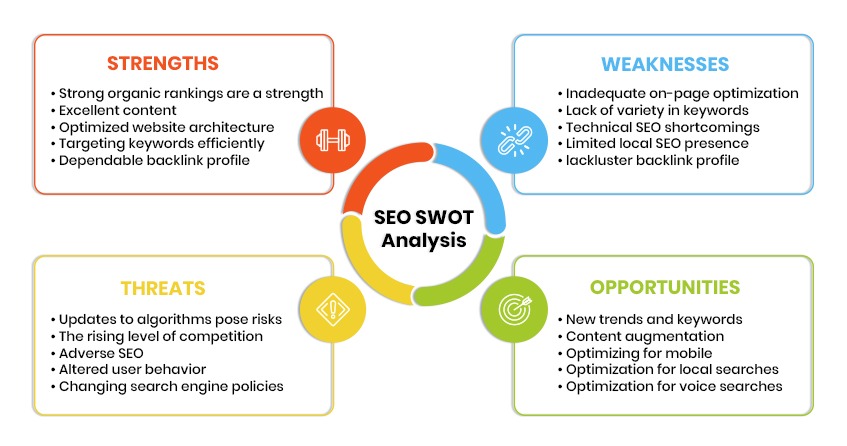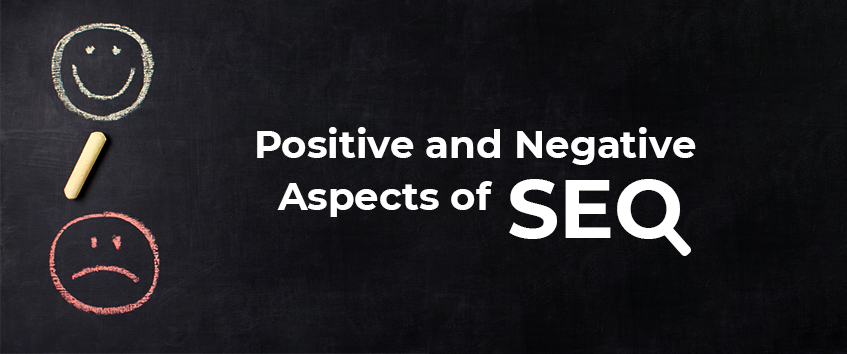Dominate the Digital Landscape with the Magic of SEO
June 30, 2023
Are you a business person? So you will definitely want your brand or venture to be noticed by people. Of course, we don’t want regular traffic for our website, we want quality and useful traffic. The basis of this mindset is to increase the number of people who want what we have to offer. The situation is different when they come looking for us instead of we are looking for them.
Google receives billions of searches daily from people actively looking for products and information. Naturally, search engines are the main gateways for website traffic. Securing high positions in the search results for your chosen keywords and phrases is essential to fully utilizing the immense potential of this traffic source. The relationship between ranking and website traffic is straightforward but significant: more people will click through to our page if we appear at the top of the search results. In order to attract and engage a wider audience, we must deliberately optimize our website for search engines. This will result in significant traffic and new prospects for our growth and success.
SEO & Our Website
In the realm of online visibility, search engine optimization (SEO) takes center stage. By implementing effective SEO strategies, you have the power to elevate your website’s ranking positions and witness a remarkable surge in traffic. As your ranks ascend, so does the influx of visitors to your site. This increased traffic serves as a gateway to attracting new clients, enhancing brand recognition, and ultimately driving business growth. To disregard the importance of SEO would be to turn a blind eye to one of the most vital sources of traffic, essentially handing your rivals complete dominance over the market. Embrace SEO as your ally and seize control of your online presence, ensuring that you harness the full potential of organic traffic and stay ahead of the competition.

In this article, we’ll examine the most effective SEO strategies that, in 2023, can help firms acquire a competitive edge and meet their online marketing objectives.
The Most Effective SEO Strategies in 2023
Content Improvement
Content optimization is one of the foundational elements of efficient SEO. To draw in both search engines and users, high-quality, pertinent, and interesting content is crucial. Businesses should concentrate on optimizing their content in 2023 by completing in-depth keyword research, strategically incorporating target keywords, and making sure the content is educational and beneficial to the target audience. Meta tags, headers, and URL optimization can also improve the visibility of the content in search results.
Optimisation for Mobile Devices
Website optimisation for mobile has become essential due to the rise in the use of mobile devices. Businesses should put a high priority on mobile optimisation in 2023 to deliver seamless user experiences across all devices. This entails putting responsive site design into practise, improving page speed, and making sure mobile navigation is simple. In addition to improving user engagement and lowering bounce rates, mobile friendliness affects rankings and increases organic traffic.
Voice Search Enhancement
Websites must be optimized for voice searches as the use of voice search grows. Businesses should concentrate on figuring out the user purpose behind voice searches in 2023 and using long-tail keywords and natural language expressions in their content. Additionally, FAQ sections, highlighted snippets, and structured data markup might aid increased exposure in voice search results.
Website Performance and User Experience
SEO is significantly influenced by website performance and user experience (UX). Businesses should put a priority on providing outstanding user experiences in 2023 by optimizing website design, enhancing site navigation, and speeding up page loads. In addition to improving SEO, a user-friendly website with simple navigation and quick-loading pages motivates visitors to remain longer, explore more pages, and make purchases, increasing organic traffic.
Influencer Marketing and Social Media
In 2023, SEO techniques that incorporate influencer and social media marketing can produce outstanding results. Increased brand visibility, the attraction of new audiences, and the creation of backlinks to the website can all be achieved by working with influencers and utilizing social media platforms. Search engine rankings can be enhanced by engaging with followers, sharing relevant content, and promoting social sharing.
Regional SEO
Optimizing for local SEO is essential for firms aiming to attract neighborhood clients. Creating and optimizing Google My Business listings, gaining online reviews, and utilizing location-based keywords should be the main priorities for businesses in 2023. This makes it easier for businesses to show up in local search results, generating targeted organic traffic from nearby potential customers.
1. KEYWORDS
Find Your Site’s Primary Keywords. primary keywords are terms that customers search for when they’re searching for exactly what you sell.
For example, for a Digital marketing company, some primary keywords might include:
- Best digital marketing company
- Marketing services
- Perfect Marketing Techniques
- Affordable digital marketing etc.
Primary keywords
The thing is, primary keywords are usually competitive. This means it may be taken into a new site according to the power of rank for these terms. So you want to consider these long-term targets in your SEO strategy. Here’s how to find your site’s primary keywords: First, note down the different terms that you would expect a customer or client to use when looking for a business like yours on Google.
Find Long Tail Keywords and Keyword Variations
The list of primary keywords you just came up with may be good to go. However, it iss worth generating long-tail visions of those terms as well. Long-tail keywords are longer search terms that typically have a lower search volume but a higher level of intent. Which means they can convert at a higher percentage compared to primary keywords.This post is sponsored by our partners Wigs
Choose Your First 5-10 Keywords
Choosing keywords is definitely more art than science. In general, you want to target low-competition terms at first (even if they don’t have a lot of search volume.) You can always scale up to more competitive keywords as your site’s SEO improves.
2. CONTENT
One of the most crucial elements for SEO is content. Your website won’t perform well in search engine results if it lacks high-quality content. The following are some of the factors that make content so crucial for SEO,
The content on your website aids in search engines should be simple. Google searches for information on your website as it crawls it to determine the subject matter. Google will comprehend your website and its aim better the more high-quality material you have.
It helps to target keywords with content. When you incorporate pertinent keywords throughout your content, search engines are better able to recognize how relevant your website is to those terms. By doing this, you can appear higher in search results for those phrases.
Blogs allow you to consistently create fresh and valuable content for your website. Search engines like Google prioritize websites that regularly publish high-quality content. By regularly updating your blog with informative and relevant articles, you can improve your website’s visibility in search engine results.
Content keeps visitors on your website. If your website’s content is interesting and informative, visitors will be more inclined to stay on it for a while. As a result, bounce rate—a factor Google considers when ranking websites—will be improved. For SEO, backlinks are essential. Google is informed that your content is valuable when other websites link to it. This may help your website rank higher and appear more frequently in search results.
In a nutshell, SEO strongly depends also on content. Your website must have high-quality content that is pertinent to your goal keywords if you want it to rank well in search engines.Here are some guidelines for producing excellent content that will improve your SEO:
Make research- Spend some time researching your target keywords and learning what people are searching for before you begin writing. You’ll be able to write more useful and pertinent articles thanks to this.
Not for search engines, but for people- While it’s crucial to sprinkle relevant keywords throughout your content, avoid doing so merely for the sake of it. Writing for humans should come first when creating material.
Make long-form content- Longer material typically performs better in search results. Make sure your information is still educational and interesting, though.
Employ pictures and videos- Your content can be visually appealing by being broken up with images and videos. Additionally, they may aid in boosting website traffic.
Publicize the information you have- After you’ve published your material, make sure to spread the word about it. Promote it on social media, add it to directories, and write a guest post for other websites.

3. User Experience (UX)
User Experience (UX) is important for SEO since it affects a website’s success in search engine results both directly and indirectly.
Improved Page Speed: The speed at which a page loads has a big impact on the user experience. High bounce rates and a bad user experience might come from slow-loading websites. Page speed is a ranking element for search engines like Google, therefore optimizing your website for shorter loading times can benefit both UX and SEO.
Enhanced Mobile Experience: With the popularity of mobile devices, it is essential to offer a seamless mobile experience. The user experience on smartphones and tablets is improved by responsive web design and mobile-friendly interfaces. Mobile optimisation is crucial for SEO since mobile-friendly websites receive higher rankings in Google’s mobile search results.
Efficient Site Layout: Visitors can locate the information they need easily thanks to intuitive and user-friendly navigation. An organized website with menus, internal links, and a logical hierarchy enhances user experience and aids search engines in comprehending the structure and content of your website.
Authenticity and Superior Quality Content: Delivering high-quality, educational, and relevant content that satisfies user needs improves user experience. Engaging content enhances dwell time and click-through rates, reduces bounce rates, and lengthens visitors’ stays on your website.
Readability and Mobility: The readability and accessibility of your website have an impact on the user experience. The readability of text that has been properly prepared with the right headings, bullet points, and brief paragraphs is improved.

4. LINK BUILDING
Link development is a vital SEO tactic that is essential for enhancing search engine results and increasing organic website traffic. It entails the procedure of obtaining high-quality backlinks to your own website from other websites. The benefit of link building is that it makes websites appear more credible, authoritative, and visible to search engines like Google. You can tell search engines that your website is reliable and beneficial to users by gaining relevant and authoritative connections from reliable websites.
The ability to raise search engine ranks is one of the main advantages of link development. Links from other websites to your website tell search engines that your material is worthwhile and deserving of being highlighted for users.
Additionally, link building promotes referral traffic. Referral traffic is created when consumers find links to your website on other platforms and click on them to visit your site. Increased website traffic, user engagement, and potential sales may result from this.
The chance to establish connections and collaborations with other websites and companies in your industry is another benefit of link development. You can build trust by contacting relevant websites and asking for links or working together on content.
SEO Beneficial Aspects
Increased Organic Visibility: SEO works to increase the visibility of your website in search engine results pages, which enables you to draw in more organic traffic.
Long-term Results: SEO is a long-term tactic that can produce long-lasting outcomes in the long run, bringing steady visibility and traffic to your website.
Cost-Effectiveness: Since SEO doesn’t need you to pay for each click or impression, it might be more economical over time than other digital marketing strategies like paid advertising.
Targeted Traffic: SEO works to draw in highly focused traffic that is more likely to turn into leads or customers by optimizing your website for particular keywords and user intent.
Brand Credibility and Trust: Users see brands that rank well in search results as credible and trustworthy, which can help your brand’s reputation.
SEO Downsides
Time-consuming: Activities like keyword research, content production, technical optimisation, and link building all count towards SEO. Results might not appear right away.
SEO is dependent on search engines: SEO is more dependable to search engines like Google to bring in organic traffic. Your website’s rankings may be affected by algorithm updates and modifications to search engine guidelines.
Competition is fierce: A lot of companies engage in SEO, making it a very crowded market. Top rankings for competitive keywords might be difficult and time-consuming to achieve.
Constantly Changing: As search engines update their algorithms and ranking variables, SEO is a constantly evolving industry. It’s crucial to keep abreast of business developments and best practices.
Lack of Control: While you can modify your website’s optimisation, you have limited influence on search engine algorithms and how your rivals modify their websites.
For the purpose of creating a comprehensive strategy, it is crucial to understand both the advantages and disadvantages of SEO. You may maximize the efficiency of your SEO efforts and improve the outcomes for your website by utilizing the strengths and resolving the shortcomings.
SEO SWOT Analysis
SWOT analysis is a strategic planning tool used to assess the advantages, disadvantages, opportunities, and threats of an organization or project. When applied to SEO, it can be used to identify areas that need development and as a tool for making decisions. An example of a SWOT analysis for SEO is shown here:

You may learn a lot about your strengths, weaknesses, opportunities, and threats by thoroughly SWOT-analyzing your SEO efforts. This study can direct your SEO approach and assist you in making defensible choices to increase the search exposure and performance of your website.
Final Thoughts
Staying current with the most recent SEO tactics is crucial for businesses to increase organic site traffic in the always changing field of SEO. The tactics covered in this blog post offer a strong framework for increasing organic traffic in 2023. Businesses may improve their online presence, draw more customers, and accomplish their marketing objectives by optimizing content, concentrating on mobile and voice search, enhancing user experience, adding influencer and social media marketing, and putting local SEO methods into practice. Businesses will surely be positioned for success by adopting these most effective SEO strategies and adjusting them to the changing digital landscape.
Achieve Online Success through SEO with Monolith as Your Strongest Ally


